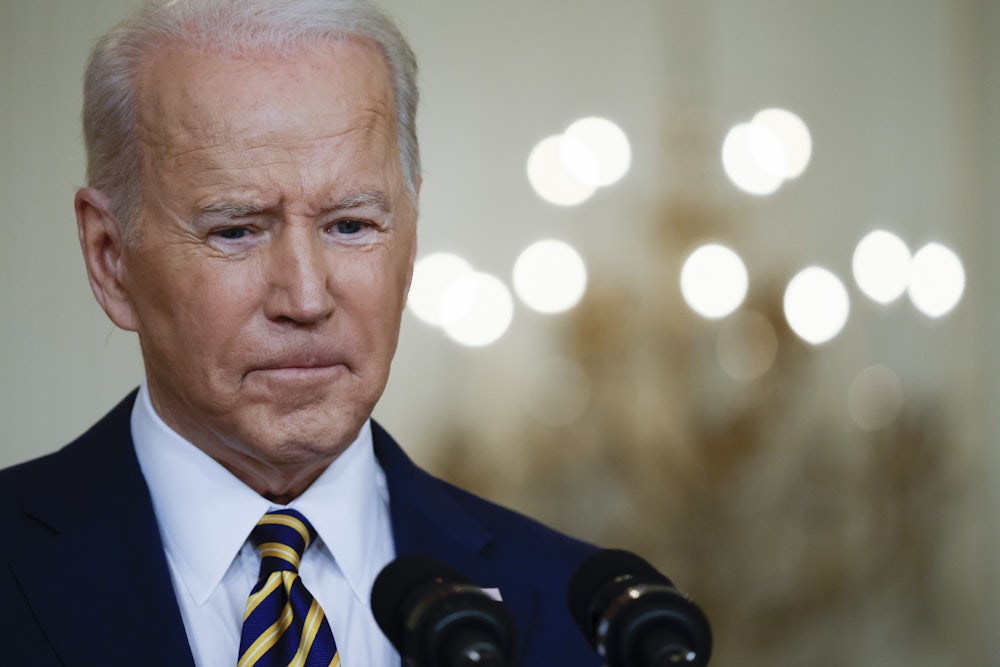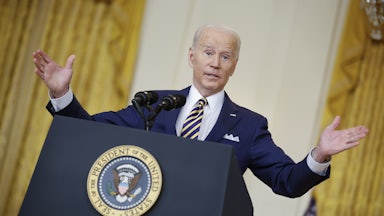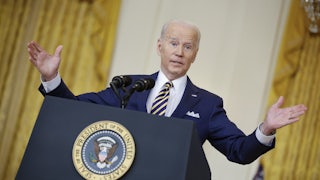If anyone should have known how congressional Republicans would respond to a Democrat in the White House, it was Joe Biden. For eight years as Barack Obama’s vice president, Biden watched as the GOP—led by current Senate Minority Leader Mitch McConnell—did everything in its power to block, stymie, and undermine the Obama administration. “We’re not here to cut deals and get crumbs and stay in the minority for another 40 years,” incoming House Minority Whip Eric Cantor told his fellow Republican congressmen a month before Obama took office. “We’re going to fight these guys.” That’s exactly what they did.
When, four years later, Barack Obama retook the White House, he saw an opportunity—maybe the sweeping victory would “break the fever” of obstruction. Guess what? It didn’t: Only weeks later, congressional Republicans were using their House majority to try to push the country off the “fiscal cliff.” This was the simple lesson from the Obama years: Republicans will not compromise in the furtherance of anything that looks like a Democratic administration’s agenda, even when that agenda promotes key conservative policy goals, as Obama attempted to give away throughout the “Grand Bargain” phase of his presidency. Somehow, Joe Biden managed to avoid learning these lessons—until Wednesday, when Republicans unsurprisingly declined to allow a voting rights bill designed to confront the GOP’s nationwide voter-suppression project to pass.
Biden ran for president on the mythical notion he alone could bring Republicans back into the fold—though he was never quite able to explain why he didn’t use these talents during the Obama years. On the campaign trail in 2019 and 2020, he insisted again and again that, once he was elected, the right-wing fever that has engulfed the country for more than a decade would finally break; congressional Republicans would, at long last, start working with Democrats again. “The thing that will fundamentally change things is with Donald Trump out of the White House. Not a joke,” Biden told reporters on a campaign stop in 2019. “You will see an epiphany occur among many of my Republican friends.”
At the time, there was a political argument for indulging in this kind of fanciful talk. Many voters were tired of the chaos and acrimony of the Trump years. Biden may have bee promising a “FDR-size presidency,” sure, but the prospect of a return to normalcy was just as enticing to many voters. And it could be argued with a straight face that few politicians better exemplified normalcy—and bipartisanship—than Biden, thanks to his long career of deal-making and backslapping in Washington.
The big problem, exemplified by the tiny hint of self-awareness that dropped in the middle of Biden’s epiphany comment with a thud—“not a joke”—was that Biden was actually fairly high on his own supply. He truly believed that his long service in the Senate would wake Republicans from their fever-dreams and suddenly Congress would start working again. His penchant for relationship-building—and the inimitable avuncular, glad-handing style that made him indispensable in the Senate—would end up yielding results for everybody. It was a theory that had no basis in reality, but Biden nevertheless insisted that it would come to pass.
On Wednesday, Joe Biden arrived at what might be one of the most important realizations of his presidency: Republicans are not going to help him. Instead, during a marathon press conference, Biden acknowledged that he was being undone by even worse obstruction than that which the last administration he was a part of endured. Republicans “weren’t nearly as obstructionist as they are now,” Biden said, citing the absence of one member, John McCain, and the transformation of another, Lindsey Graham, who would cross the aisle from time to time.
This is a crucial, and perhaps administration-altering admission. Biden’s press conference was notable for not just its fieriness but also for its length—and, for that matter, its existence at all. As my colleague Walter Shapiro wrote on Wednesday, aides had previously kept the president “shrouded … in bubble wrap.”
Understandably, most of the attention has focused on his comments on Ukraine—and the unfortunate fact that he may have given Vladimir Putin a near green light to invade. And yet this admission nevertheless suggests an important break with the flawed philosophy that has guided Biden not just since the campaign but for his entire political life: the outdated and misguided hope that Republican votes could be had with the right outreach and appeals.
Biden got lucky once on this score: Bipartisanship produced a flawed infrastructure bill that, to this point, may represent the administration’s most important legislative victory. But the handful of Republicans who had something to gain from appearing “bipartisan” have already gotten their reward; they have no interest in aiding this administration any further, especially with the midterm—and then the presidential—elections rapidly approaching.
This, of course, also means that Biden is stuck with the pamphlet-thin Democratic margins he has in Congress—and with at least two senators, Joe Manchin and Kyrsten Sinema, who have proven to be just as committed to stymying his agenda as their Republican counterparts. But the first step in recovery is admitting you have a problem, and acknowledging the failure of bipartisanship is crucial to righting an administration that has, in recent months, gone badly off the rails. It wasn’t until his second term that Obama fully reckoned with this reality. Biden got there faster. Perhaps that will count for something; for now, it will have to do.










